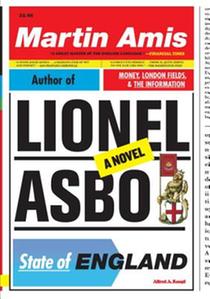
 Who hasn't seen pictures of a slightly stunned lottery winner posing with an oversized check and wondered how those riches will change their lives? Now imagine that bemused winner is a congenital criminal in a grimy industrial suburb of London and you can begin to grasp the comic possibilities of Martin Amis's 13th novel, Lionel Asbo: State of England.
Who hasn't seen pictures of a slightly stunned lottery winner posing with an oversized check and wondered how those riches will change their lives? Now imagine that bemused winner is a congenital criminal in a grimy industrial suburb of London and you can begin to grasp the comic possibilities of Martin Amis's 13th novel, Lionel Asbo: State of England.
Diston, where Lionel and his nephew Desmond Pepperdine (only six years his junior) live, is the kind of place a 21st-century Dickens might conjure up, "where calamity made its rounds like a postman." Lionel, who's changed his name to "Asbo," in tribute to his frequent encounters with England's Anti-Social Behaviour Orders, works in the "very hairiest end of debt collection," making his rounds with a pair of pitbulls that will figure prominently in the novel's terrifying climax. After Desmond's mother dies, Lionel becomes the boy's unofficial guardian (they live together in Lionel's tiny 33rd-floor flat in a building where the elevator stops at the 21st), but Des is determined to extricate himself from life in the underclass. While Lionel is serving one of his frequent brief prison terms, Des fills out a lottery ticket for his uncle that wins £139 million.
It doesn't take long for the "Lotto Lout," as the British tabloids dub Lionel, to luxuriate in his newfound wealth, ensconcing himself in a gothic mansion with a girlfriend whose obsessions are cosmetic surgery and bad poetry. Deploying his accomplished satirical gifts with surgical skill, Amis delivers a grimly humorous portrayal of life among lower-class Britons alongside an equally incisive glimpse of the perils of undeserved celebrity.
If Lionel Asbo merely were the story of one dubious character's mishaps after coming into unearned riches, it would be amusing enough. But Amis is just as much concerned with the complex relationship between Lionel and Desmond, and through them the sometimes inexplicable bonds that tie family members to each other and the ways we can love against all our better instincts.
Stories of lottery winners who have come to various forms of grief are well-documented, but as tragic as those tales may be, perhaps it's up to the artistry of fiction to make them fully real. In doing that with wit and style, Martin Amis shows us that money changes everything and nothing. --Harvey Freedenberg
Shelf Talker: Martin Amis's 13th novel is a satiric look at what happens when a career criminal becomes a lottery multimillionaire.

